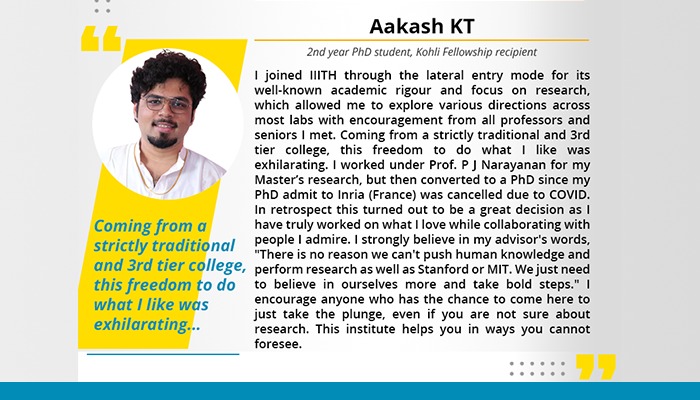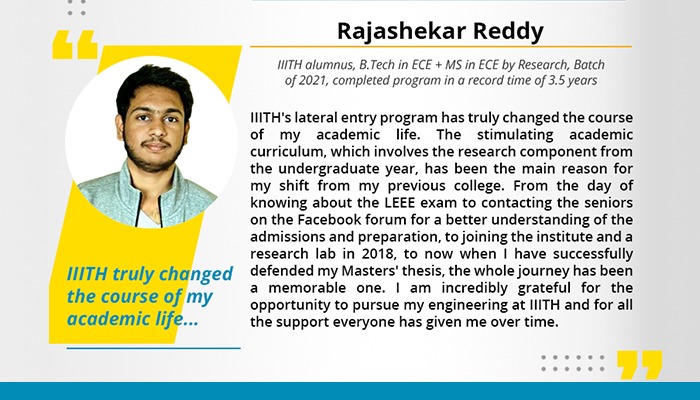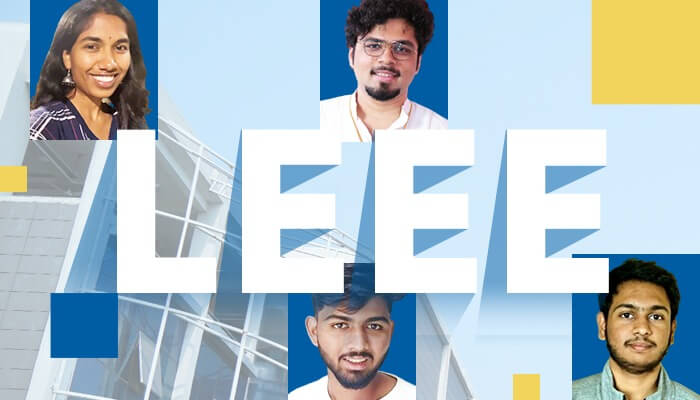Every year, with an ever-increasing pool of engineering aspirants, there’s a sizeable number that doesn’t make the cut to tier 1 institutes. Here’s a plan B for the research enthusiasts amongst them.
“Have you ever heard of someone switching colleges mid-degree?”, exclaims Apoorva Thirupathi, adding “Well, I hadn’t!” It was over a serendipitous telephonic conversation that she first heard of something bizarre and wonderful all at once – the lateral entry entrance examination (LEEE) conducted by IIITH. It refers to a direct admission into the institute during the second year BTech course. But unlike a single degree awarded at the end of 4 years, here, a lateral entry graduate earns two: a BTech as well as an MS. Speaking of the focus on a research-led education at IIITH, its Director Prof. P. J. Narayanan says, “We are particularly proud of the Dual Degree program where we give the undergraduate students an integrated MS by Research degree. This way we get to prepare them for the fundamentals as well as make them do research.” While the program has been active since 2004, in 2010, a decision was taken to throw it open to students who missed out on the opportunity of joining IIITH after their 12th grade. And that’s how the lateral entry programme began.
Stuck In A Rut?
Apoorva had enrolled for a BTech degree in one of the newer private colleges in Hyderabad city. It wasn’t one of her top choices though. “I really missed having a community of like-minded people who would geek out on Computer Science and be enthusiastic about it since that was what I had signed up for. Plus the whole thing was eating me up that I didn’t give it my best. I could have been in a different place, had things gone differently,” she says referring to her JEE Mains rank. Discovering that her ticket out of that place was only 12 weeks away, Apoorva marked it down in her calendar and stopped attending all classes. “I thought it’s this or nothing,” she says.
Unlike Apoorva though, when Rajashekar Reddy didn’t make it into IIITH after his 12th, he plunged headlong into giving it another shot, this time via the LEEE. ”I pretty much started preparing for it from my 1st semester at JNTU Hyderabad,” he says. He discovered an online forum called Lateral Entry-Helpdesk on Facebook through which he got acquainted with the exam pattern, interview style; the kind of questions asked, whether internships matter for application and so on. For Aditya Kadam too, IIITH was his “dream college” but he acknowledges that he was underprepared right after school. In Aakash KT’s case, when he embarked on his Computer Science engineering course at the University of Mumbai, he expected it to be of a certain level. “A lot of it involved rote learning,” he says ruefully. With friends studying in IITs and comparing notes, he was made painfully aware of the difference in teaching methodology, making him yearn for a change.

Start All Over
The LEEE presents a perfect opportunity for a do-over. Acknowledging the limitations of the current way to assess engineering aspirants, Prof. P. J. Narayanan says, “Unlike a very high pressure JEE-like exam which is more of a test of the student performance on that day and not a good test of somebody’s ability, the LE programme is a separate channel to which aspirants can apply after the end of 2 years. They have to take a test which is based on fundamentals and more importantly we interview every candidate to ensure they are really oriented towards research”. While leaving school is an exciting time for students, it can be a confusing one too. “We find that students who join us after 12th are not fully aware of what they want to do whereas those who have joined a college – whether IIITH or somewhere else – really grow up in the first two years. Some of them go on to realise that they want a research-based degree and those are the targets for our lateral entry programme,” says Prof. P. J. Narayanan
The Big Bogey
In Aditya’s case, the research spark in him was kindled when he was in his 2nd year BTech. “One of my seniors at VIT was conducting research in Chennai and I was motivated after picking his brains. We corresponded a lot and he guided me. That’s when I thought that coming to IIITH and getting an exposure to undergrad research would be a really good option for me.” There is however a world of difference between reading up about something and actually getting your feet wet. Rajashekhar admits that he didn’t really know anything about research much less if he would be a good “fit”. “I had only heard about the placements part,” he confesses, adding that it was scary initially learning about the requirements of the demanding dual degree programme. Aakash too was a trifle hesitant about following a career in research but he says, in hindsight he has always been inclined towards it even as a high schooler. “I tried to build a basic computer system with my TV as the display unit by reading books on it. Thanks to this exploratory streak, I guess I was confident that I wouldn’t be terrible at research.” While calling its curriculum the best part about IIITH, Apoorva says the adjustment to it was far from easy – a sentiment that is shared by many of her peers from the LE programme. “I was getting 9s and 10s effortlessly in my previous college but here I had to put in a lot of effort. The curriculum here is so unforgiving, but that’s precisely what you sign up for.”
Handling The Transition
What really helps jittery candidates settle down in the new environment is a 2-week-long camp of sorts that they are invited to, well before the rest of the batch comes in. The idea is to equip entrants with a few basic tools that they will need before the semester begins. “For instance, some of us didn’t know Git, and that is fundamental. If you have to do an assignment you need to know version control, learning basic shell commands and so on. Basically if you have these tools in your repertoire, it helps. It helped us in getting used to the campus and meeting the other LEs as well,” says Apoorva. Labelling the IIITH community as a tight-knit one, Aditya says that the fact that almost everyone here knows the other by name came as a pleasant surprise. “Coming from a large college where there were a lot of students and the community interaction was rather low, it feels good that the professors here know me personally and know what I’m doing.”
Achieving and Excelling
Despite their self-doubts and nervous first steps into research, all selected candidates hands-down have excelled in their respective areas. Expressing happiness with the number of students the institute has welcomed over the years through this channel, Prof. P. J. Narayanan says, “These are people who realised they wanted to be researchers, missed the chance maybe the first time but now are eager and that really shows. Our students have done very well in higher studies, in companies, in startups and different professions”. Thus we have Rajashekhar Reddy who not only completed his dual degree in a record time of 3.5 years after submitting his thesis on air pollution but also bagged a pre-placement offer before formally graduating. Aakash found his calling in research and has taken the next leap into pursuing a PhD at IIITH. One and a half years into the course at IIITH and Aditya is enjoying his time as a ‘Pre-Cog’er – or a researcher working on various aspects of social systems such as detecting and weeding out hate-speech on online social media. Not wanting to leave any stone unturned, Apoorva, by her own admission analysed in great detail every single research lab and the projects each professor was working on. “I got a full overview of all the things that happen in Computer Science,” she says before zooming in on Blockchain where she is confident of adding value.

Cutting-Edge Research? The Right Place!
If there’s one thing all LE candidates say in somewhat unison, it is this: While the IIITH tag carries its own merits, such as the avenues that will open up, the network that one can access and the perks associated with it, it’s the community of passionate academics that matters Thanks to the unfettered exploration of various niche areas of Computer Science and Electronics and Communication that is encouraged here, it is impossible to walk away unimpressed. And like Apoorva puts it,”If you are not enjoying your time in your other college, you will like it here”. Just like it’s not enough possessing a mere MBBS degree in order to be a doctor, and a specialisation is a must to be at the top of your profession, Prof. PJN says that the same holds for the IT sector. “Everyone wants to be a specialist in AI or algorithms or VLSI or communications or robotics and other such areas to be a technology leader in the future. So, If research is in your belly, you must consider this programme. When you are selected based on rigorous evaluation, you will have the opportunity to work with the top leaders in the most emerging areas of Computer Science and Electronics at IIITH.“
To know more about the lateral entry entrance examination, click here.



Next post